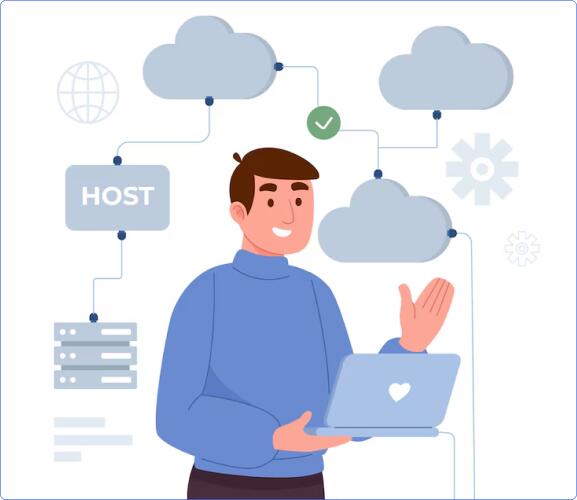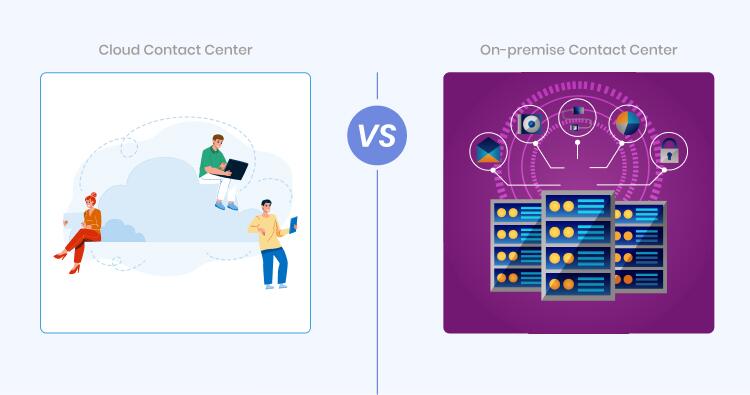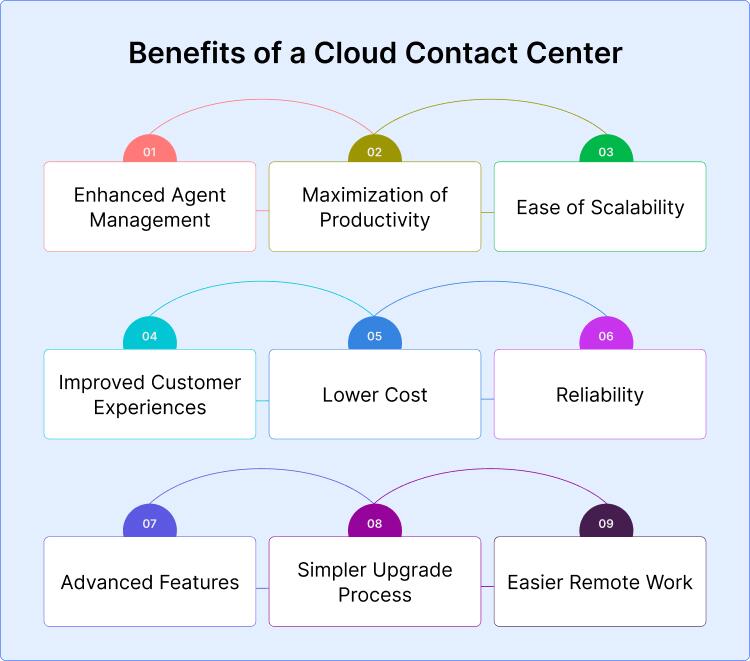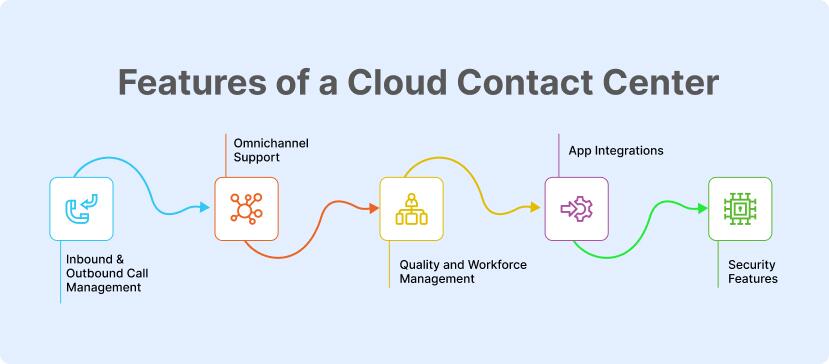
Research conducted by marketsandmarkets found that the cloud contact center market is expected to grow from $26.2 billion in 2024 to $86.4 billion in 2029 at a CAGR rate of 26.9% during the forecast period.
We all know exceptional customer service can make or break a business in today’s fast-paced digital world. A cloud contact center is a revolutionary solution to ensure that service. Unlike on-premise systems, a cloud contact center offers a modern, flexible, and cost-effective approach to managing customer communications.
In this blog post, we’ll explore what a cloud contact center is, dive into its key features, and highlight the compelling benefits it brings to businesses of all sizes. Whether you’re looking to enhance customer satisfaction, streamline operations, or stay ahead of the competition, you’ll find this article resourceful like never before.
What is a Cloud Contact Center?
A cloud contact center is a cutting-edge customer service solution that revolutionizes the way businesses manage their interactions with customers. By leveraging the power of the internet and cloud computing, it eliminates the need for traditional on-premise hardware and software. This modern approach provides a scalable, cost-effective, and feature-rich platform that centralizes all customer communications like voice calls, emails, SMS, social media, or web chat into one seamless, user-friendly interface.
Designed to handle both inbound and outbound communications, cloud contact centers enable agents to access the platform from anywhere with an internet connection, offering unparalleled flexibility and remote work opportunities. They come packed with advanced features such as call routing, call recording, performance analytics, and CRM integrations that enhance agent productivity and customer satisfaction.
By unifying all communication channels, a cloud contact center ensures that businesses can respond to customer requests promptly and efficiently, optimizing every interaction whether you’re looking to enhance customer engagement or streamline your operations.
Cloud Contact Center Platform

Don’t be confused, Cloud Contact Center Platform and Cloud Contact Center can be used interchangeably, although there is a minor difference between them. A Cloud Contact Center Platform is a comprehensive, cloud-native technology framework designed to support multichannel or omnichannel communication between customers and agents. Unlike a general cloud contact center, which refers to the overall service managing customer interactions, a cloud contact center platform specifically denotes the underlying software suite that powers these interactions. This platform is crucial for optimizing both customer experience and agent efficiency.
The platform is the backbone, providing the necessary tools and integrations to create a functional and efficient contact center. It can be tailored to manage both incoming and outgoing calls and messages. In short, we can say that the cloud contact center platform is the technological foundation that supports and enhances the broader concept of a cloud contact center. It ensures that businesses can deliver exceptional, seamless, and flexible customer service in the digital age.
How Does a Cloud Contact Center Work?

Cloud contact centers operate on a remote server infrastructure managed by a contact center provider, accessed through a secure internet connection. Here’s a breakdown of how in general a cloud contact center works:
Cloud Infrastructure
Service providers manage all hardware, software, and maintenance, removing the burden from your IT team. The infrastructure is hosted remotely, eliminating the need for on-premises hardware and reducing upfront costs and infrastructure management responsibilities. Voice over Internet Protocol (VoIP) technology is utilized, which converts voice into digital data, compresses it, and sends it over the internet.
Key Functionalities
Omnichannel Routing—
- Automatically routes inquiries to the most appropriate agent if enabled
- Ensures faster resolution and better customer experience
- Integrates multiple communication channels (voice, social media, email, chat)
- Allows agents to access all customer correspondence from a single interface
Interactive Voice Response—
- Greets callers and collects information
- Directs callers to the appropriate department or agent
- Offers customizable menus and options to streamline interactions
Call Recording and Monitoring—
- Enables supervisors to monitor calls for training and quality assurance
- Maintains records of interactions for compliance and dispute resolution
Real-Time Analytics—
- Provides insights into call volume, agent performance, and customer sentiment
- Identifies areas for improvement and optimizes contact center operations with detailed reports
Customer Relationship Management (CRM) Integration—
- Integrates with CRM software to synchronize communication data
- Gives agents access to customer information and interaction history for personalized service
Operational Workflow
Cloud contact centers handle customer interactions across various channels, including phone, email, chat, and social media, routing them to the appropriate agent using advanced algorithms that consider agent availability and interaction type. Agents use a cloud-based interface to manage interactions, access customer data, and utilize tools like call scripts and knowledge base articles.
This interface allows agents to work from any location with an internet connection, providing flexibility and continuity in operations. Post-interaction processes involve automated updates to customer records and the initiation of follow-up actions. Customer feedback is collected to improve service quality and customer satisfaction.
Security and Compliance
Data security is ensured through encryption and strict access controls, protecting customer information. Cloud contact centers adhere to industry standards and regulations such as GDPR and HIPAA. Disaster recovery plans are in place to ensure business continuity during unforeseen events, protecting your operations and customer data.
Scalability and Flexibility
Cloud contact centers can easily adjust resources to accommodate fluctuating needs, such as adding more channels or employees. This scalability is supported by a pay-as-you-go model, which allows businesses to scale operations without significant investment, paying only for the resources they use.
The setup enables agents to work remotely, providing seamless assistance from anywhere. Utilizing secure VPNs, cloud-based applications, and other tools, these centers support remote work effectively, ensuring continued service delivery.
Example: Real-World Application
Consider Olivia, a pet shop owner facing a flood of customer inquiries after an influencer promotion. To handle the surge, Olivia opts for a cloud contact center. She selects a provider, configures the software to her needs, and integrates it with her existing systems. The cloud-based setup allows her to hire remote customer support staff, ensuring seamless assistance from anywhere. The convenience and flexibility of the cloud enable Olivia to handle the increased demand and provide excellent customer service.
Cloud vs On-premise Contact Center: Which One is the Best?

A cloud contact center platform operates on a remote server managed by third-party vendors. They offer high scalability, allowing businesses to adjust resources quickly based on demand. Additionally, the cost structure is typically pay-as-you-go, avoiding large upfront expenses. Maintenance, updates, and security are handled by the provider, reducing the burden on the organization.
Cloud contact centers enable remote accessibility, allowing agents to work from various locations. Integration with other cloud services and APIs is seamless, providing smooth connectivity to external tools. Security measures are robust, with shared compliance responsibilities. Furthermore, built-in redundancy and disaster recovery features of cloud contact center solutions ensure business continuity.
On the other hand, on-premise contact centers require significant investments in physical infrastructure, including servers and hardware. Scalability is limited to existing infrastructure, making it less flexible. The cost involves high upfront expenses for hardware and ongoing maintenance.
Maintaining and updating on-premise contact centers, organizations require a dedicated IT team. Accessibility is limited to on-site locations, restricting remote work options. Integration with external tools may require additional resources, and security measures are entirely managed by the organization. Disaster recovery setup is manual and resource-intensive.
Which One is the Best?
Well, for most modern businesses, cloud contact center software is the preferable choice due to its flexibility, scalability, lower upfront costs, and ease of maintenance. It is particularly suited for companies with remote or distributed workforces and those needing to adapt quickly to changing business needs.
On-premise contact centers may be suitable for organizations with existing infrastructure, requiring more control over their systems and operating in environments where constant internet connectivity is not guaranteed. However, the benefits of a cloud contact center make it a robust solution for today’s dynamic business environment.
Benefits of a Cloud Contact Center

This is the main point of all our discussion, isn’t it? The benefits of a cloud contact center you get for your business instead of an on-premise contact center. A cloud contact center provides numerous advantages that make it a superior choice for modern businesses. Let’s go straight to the points:
- Enhanced Agent Management Using Analytics
Cloud contact centers come with sophisticated workforce management tools and analytics that optimize operations. For instance, they use complex algorithms to forecast inbound interaction volumes, allowing managers to make informed staffing decisions in advance. This leads to better agent utilization and more efficient handling of customer inquiries.
- Maximization of Productivity Using Automation and Sophisticated Call Routing
Cloud contact centers are equipped with intelligent ticket and call routing systems that automate basic tasks. These systems streamline workflows, reduce agent idle time, and allow agents to focus on assisting customers rather than performing menial tasks. This automation enhances overall productivity and efficiency within the contact center.
- Ease of Scalability
As businesses grow, so does the need for customer service capabilities. Cloud-based contact centers allow for seamless scaling without the need for installing additional hardware. New agent accounts can be set up quickly by contacting the solutions provider, making it easy to adapt to changing business needs without significant downtime or infrastructure changes.
- Improved Customer Experiences
With automated operations and an optimized workforce, agents can focus on delivering better customer experiences. Cloud contact centers facilitate faster ticketing processes and ensure complaints are resolved promptly, resulting in high customer satisfaction. Additionally, their omnichannel capabilities allow agents to engage with customers through their preferred communication channels, providing a more personalized service.
- Lower Cost of Ownership with Higher Returns
Unlike on-premise centers that require expensive equipment and ongoing maintenance, cloud contact centers operate on a subscription fee model. This reduces upfront capital expenditures and maintenance costs. Providers offer various pricing plans to suit different business needs, ensuring cost efficiency and higher returns on investment.
- Reliability
Most cloud contact center providers guarantee nearly 99% uptime, ensuring minimal disruption in daily operations. Businesses can rely on built-in redundancy and disaster recovery options, enhancing overall reliability and business continuity.
- Advanced Features
Cloud contact centers offer access to state-of-the-art features and capabilities, such as multi-channel support, artificial intelligence, and real-time analytics. These advanced tools improve operational efficiency and customer service quality. Integration with other systems, like CRM and ERP, is seamless, streamlining workflows and enhancing data sharing.
- Simpler Upgrade Process
With cloud contact centers, software upgrades are managed by the provider and occur with minimal disruption. This contrasts with on-premise systems, where upgrades are manual and can be resource-intensive.
- Easier Remote Work
Agents can log in remotely, enabling work from anywhere with a strong internet connection. This flexibility supports a distributed workforce and ensures consistent service delivery.
These advantages make cloud contact centers an attractive option for businesses aiming to improve customer service and operational efficiency. Although, on-premise contact centers might be preferable for some businesses most of today’s small and medium enterprises prefer cloud contact center solutions because of their benefits.
Essential Features of a Cloud Contact Center Software

When considering a cloud contact center software for your business, several essential features stand out to ensure optimal performance and customer satisfaction. These features can significantly enhance both inbound and outbound operations, improve workforce management, and offer robust analytical insights.
Inbound Call Management
- IVR (Interactive Voice Response): Automates initial customer interactions, allowing callers to navigate through a voice menu to find the appropriate assistance
- ACD (Automatic Call Distribution): Efficiently routes incoming calls to the most suitable agents based on predefined criteria such as skills and availability
- Virtual Agents: AI-powered chatbots handle basic inquiries, providing self-service options that improve customer experience and reduce agent workload
Outbound Call Management
- Auto Dialers: Enhance efficiency in outbound calls by automating the dialing process
- Predictive Dialers: Dial multiple numbers at once, connecting live calls to available agents based on predicted availability
Omnichannel Support
- Unified Communication Channels: Cloud contact center platforms integrate various channels such as phone, email, chat, and social media into a single interface, enabling seamless transitions and a holistic view of customer interactions
- Consistent Customer Experience: Agents can maintain context across different channels, ensuring consistent and personalized interactions
Quality and Workforce Management
- Analytics: Provide real-time and historical data on contact center performance, helping managers track key metrics and identify improvement areas
- Call Recording: Facilitates quality assurance and training by recording and reviewing customer interactions
- Speech Analytics: Offers detailed analysis of conversations to detect sentiment and identify potential issues
- Customer Surveys: Gather direct feedback on agent performance, informing continuous improvement efforts
App Integrations
- CRM Integration: Ensures agents have access to comprehensive customer data, improving interaction efficiency and personalization
- Team Chat and Collaboration Tools: Support communication and collaboration among remote agents, fostering a cohesive work environment
- Workspace Integration: Streamlines administrative tasks through integration with all workspace applications
- Single Sign-On (SSO): Simplifies login processes, enhancing security and user convenience
Security and Compliance
- Robust Security Measures: Include data encryption, secure access controls, and regular security audits to protect sensitive customer information
- Compliance with Regulations: Ensure adherence to industry standards like PCI DSS and GDPR, maintaining data privacy and integrity
Please note that most advanced features are not included in the basic plan and may require additional payment. However, it’s important to assess which features are truly necessary for your contact center, as you may not need all of them to operate effectively.
Cloud Contact Center Pricing

Cloud contact center solutions offer flexible and scalable options for managing customer interactions. The pricing for these solutions is typically structured on a monthly subscription basis, influenced by several key factors.
First, the number of users significantly affects the cost. Most cloud contact center platforms operate on a per-user pricing model, which generally becomes more cost-effective as the team size increases. Larger teams benefit from economies of scale, resulting in a reduced per-user cost compared to smaller teams.
Besides, the range of features included in the plan determines the overall price. Basic plans usually cover essential functions like voice calls, while advanced plans offer a broader array of capabilities such as video conferencing, chat, CRM integrations, AI-powered tools, and analytics. Businesses must evaluate which features are necessary for their operations to avoid paying for unnecessary functionalities.
Furthermore, usage patterns also play a crucial role in pricing. Providers often charge based on the volume of voice calls, text messages, or data storage. Understanding how these usage metrics translate into costs is essential for budgeting accurately.
Here’s a detailed look at the pricing and features of some top cloud contact center software providers:
| Provider | Top Features | Basic Plan Pricing |
| KloudTalk |
|
$25/month |
| Nextiva |
|
$18.95/user/month |
| Zendesk |
|
$55/agent/month |
| RingCentral |
|
$30/user/month |
| CallHippo |
|
$18 /month |
How to Choose the Right Cloud Contact Center Solution?

Selecting the right cloud contact center solution requires careful evaluation of several critical factors to ensure it aligns with your business goals and provides a high-quality customer service experience. Before wrapping up the blog let’s check some crucial points to help you make an informed decision:
- Assess Your Business Needs: Identify communication channels, agent requirements, and desired features. Ensure the solution aligns with your business goals
- Evaluate Features and Functionality: Look for skills-based routing, call recording, and CRM integration. These features streamline operations and improve service quality
- Consider Pricing and Scalability: Choose a provider that fits your budget and offers scalable solutions. This ensures the software can grow with your business
- Ensure Security and Compliance: Verify the vendor prioritizes data security and complies with privacy regulations. This safeguards customer information
- Look for Reliable Customer Support: Choose a vendor with a strong track record for timely and effective technical support. Reliable support is essential for a smooth experience
- Try Before You Buy: Use a trial period to assess the software’s compatibility with your needs. This helps identify potential challenges before committing
- Focus on Agent Experience: Ensure the software provides useful tools and is easy for agents to use. Look for automation tools, chatbots, and self-service options
- Ensure High Reliability and Uptime: Look for reliable infrastructure with high availability and uptime guarantees. Ensure it includes disaster recovery and proactive monitoring
- Integration Capabilities: Ensure the cloud contact center integrates with your CRM, knowledge base, call recording, and workforce management systems
Conclusion
Now it must be clear to you that by using a cloud contact center businesses have a diverse range of options to meet their customer interaction needs. From Zendesk’s robust agent workspace to KloudTalk‘s comprehensive omnichannel support, each platform offers distinct advantages tailored to different organizational requirements. Whether prioritizing cost efficiency, scalability, or advanced features like AI-powered chatbots and real-time analytics, businesses can select a cloud contact center solution that enhances customer service effectiveness and operational efficiency.




























